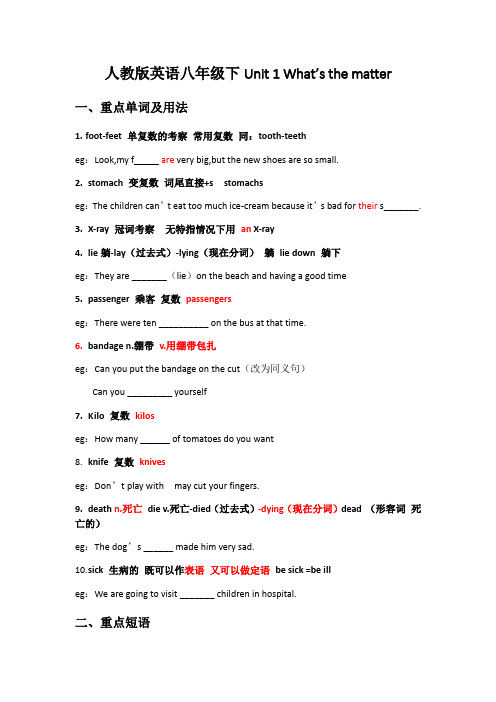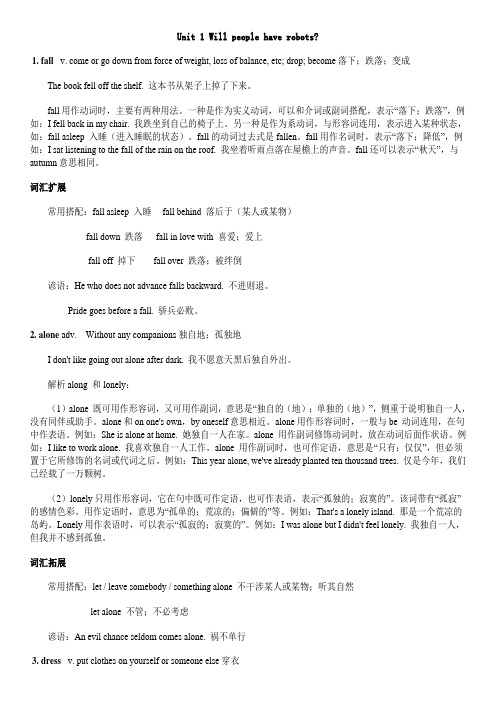八年级下册英语第一单元知识点
人教版八年级英语下册 Unit 1 What’s the matter?知识点复习

人教版英语八年级下册第一单元知识点过关Unit 1 What’s the matter?一、重点短语1. have a fever 发烧,具体运用:She has a fever and she should lie down and rest.2. have a cough 咳嗽,cough既可以作名词,也可以作动词3. have a toothache 牙疼;tooth牙齿+ ache疼痛toothache 牙痛4. talk too much 说得太多;类似短语:eat too much吃太多5. drink enough water 喝足够的水;take enough money带够钱6. have a cold 受凉、感冒;也可以用catch a cold7. have a stomachache 胃疼;stomach胃+ache疼痛stomachache 胃疼8. have a sore back 背疼;sore疼痛+back背sore back背疼9. have a sore throat 喉咙痛10. lie down and rest 躺下休息11. hot tea with honey 加蜂蜜的热茶;with表示“带有”12. see a dentist 看牙医;看医生用“see”13. get an X-ray 拍X 光片14. take one’ s temperature 量体温;量体温、服药都用“take”15. put some medicine on sth. 在……上面敷药;例如:put some medicine on the cut在切口处敷药16. feel very hot 感到很热;feel感官动词,后接形容词17. sound like 听起来像;例如:sounds like a good idea 听起来像个好主意18. all weekend 整个周末;类似短语:all day \ all night \ all month19. in the same way 以同样的方式20. go to a doctor 看医生21. go along 沿着……走;类似短语:walk along22. on the side of the road 在马路边23. shout for help 大声呼救24. without thinking twice 没有多想;without是介词,后接动词ing形式25. get off 下车;反义词get on上车26. have a heart problem 患有心脏病27. to one’ s surprise 使....... 惊讶的;例如:to my surprise \ to his surprise28. thanks to 多亏了、由于;例如:Thanks to the the doctors , the patient was saved in time. 多亏了医生们,这个病人及时被救了。
最全面人教版八年级下册英语第一单元知识点归纳总结

Unit 1 What's the matter?一、词汇与短语◆重点单词A部分1.matter n. 问题;事情2.sore adj. 疼痛的;酸痛的3.stomachache n. 胃痛;腹痛4.foot n. 脚;足5.neck n. 颈;脖子6.stomach n. 胃;腹部7.throat n. 咽喉;喉咙8.hurt v. (使)疼痛;受伤9.fever n. 发烧10.passenger n. 乘客;旅客11.lie v. 躺;平躺12.break n. 间歇;休息13.rest v. &n. 放松;休息14.onto prep. 向;朝15.X-ray n. X射线;X光16.trouble n. 问题;苦恼17.toothache n. 牙痛18.hit n. (用手或器具)击;打19.headache n. 头痛20.herself pron. (she的反身代词)她自己21.off adv. & prep. 离开(某处);不工作;从……去掉B部分1.bandage n. 绷带v. 用绷带包扎2.press v. 压;挤;按3.sick adj. 生病的;有病的4.knee n. 膝;膝盖5.breathe v. 呼吸6.knife n. 刀7.sunburned adj. 晒伤的8.blood n. 血9.ourselves pron. (we反身代词)我们自己10.mean v. 意思是;打算11.climber n. 登山者;攀登者12.importance n. 重要性;重要13.risk n.&v. 危险;风险;冒险14.decision n. 决定;抉择15.accident n.(交通)事故;意外遭遇16.control v.&n. 限制;约束;管理17.situation n. 情况;状况18.spirit n. 勇气;意志19.kilo( = kilogram) n. 千克;公斤20.death n. 死;死亡21.rock n. 岩石22.nurse n. 护士◆重点短语A部分1.have a cold 感冒2.lie down 躺下3.have a stomachache 胃痛4.take one's temperature 量体温5.have a fever 发烧6.to one's surprise 使……惊讶的是7.get off 下车8.right away 立即;马上9.take breaks (take a break) 休息10.talk too much 说得太多11.drink enough water 喝足够的水12.have a very sore throat 嗓子非常疼13.get an X-ray 拍X光片14.see a dentist 看牙医15.drink some hot tea with honey 喝一些加蜂蜜的热茶16.put some medicine on sth.在……上面敷一些药17.feel very hot 感到很热18.sound like 听起来像19.all weekend 整个周末20.in the same way 以同样的方式21.go to a doctor 看医生22.go along 沿着……走23.on the side of the road 在马路边24.shout for help 大声呼救25.without thinking twice 没有多想26.have a heart problem 有心脏病27.thanks to 多亏了;由于28.in time 及时29.save a life 挽救生命30.get into trouble 陷入麻烦31.hurt oneself 受伤32.fall down落下;摔倒B部分1.be used to 习惯于……;适应于……2.in a difficult situation 在困境中3.take risks (take a risk) 冒险4.keep on doing sth. 继续(或坚持)做某事5.run out (of) 用尽;耗尽6.make a decision 作出决定7.cut off 切除8.get hit on the head 撞到头部9.get out of 离开;从……岀来10.be interested in 对……感兴趣11.give up 放弃12.mean doing sth. 意味着做某事13.put a bandage on sth. 用绷带包扎…14.lose one's life 失去生命15.feel sick 感到恶心16.mountain climbing 登山运动17.have problems breathing 呼吸困难18.be in control of 掌管;管理◆重点句子A部分1.What's the matter with you?=What's the trouble with you?=What's wrong with you?你怎么了?2.What should she do? 她该怎么办呢?3.Did you fall down? 你跌倒了吗?4.Should I take my temperature? 我应该量一下体温吗?5.I think I sat in the same way for too long without moving.我想我以同样的姿势一动不动地坐得太久了。
最新人教版八年级英语下册第一单元知识点汇总

最新人教版八年级英语下册第一单元知识点汇总Unit 1 What’s the matter?一、基础知识1.我感冒了。
可以表达为I had a cold、catch a cold或have the flu。
have a fever表示发烧,have a cough表示咳嗽,have a stomachache或肚子疼表示胃疼,have a toothache表示牙疼,have a headache表示头疼。
2.将身体部位和ache(疼痛)结合起来构成新的复合词,如stomach+ache=stomachache,head+ache=headache,tooth+ache=toothache,back+ache=backache,表示相应的疼痛。
3.“怎么啦?出什么事情了?”可以表达为What’ s the matter。
也可以用What’ s the trouble with you?或What’ s wrong with you。
matter和trouble为名词,其前可加the或形容词性物主代词,而wrong是形容词不能加the。
用于询问某人有什么病或遇到什么麻烦、问题,其后跟询问对象时,与介词with连用,如What’s the matter with sb。
= What’s your trouble?= What’s up?= What happens to sb。
举例来说,当问到“What’s the matter with you?”时,回答可以是“I have a bad cold.”4.maybe表示“或许”,常用于句首,表示可能性,后加句子。
例如Maybe you are right。
may be是情态动词+be的结构,意为“可能,也许”,后加名词、代词或形容词。
例如He maybe angry。
sound like可以和名词、代词以及从句结合使用,如It sounds like you don’t know the truth.It sounds like a good idea。
最新人教版八年级下册英语第一单元知识点

人教版英语八年级下Unit 1 What’s the matter一、重点单词及用法1.foot-feet 单复数的考察常用复数同:tooth-teetheg:Look,my f_____ are very big,but the new shoes are so small.2.stomach 变复数词尾直接+s stomachseg:The children can’t eat too much ice-cream because it’s bad for their s_______.3.X-ray 冠词考察无特指情况下用an X-ray4.lie躺-lay(过去式)-lying(现在分词)躺lie down 躺下eg:They are _______(lie)on the beach and having a good time5.passenger 乘客复数passengerseg:There were ten __________ on the bus at that time.6.bandage n.绷带v.用绷带包扎eg:Can you put the bandage on the cut(改为同义句)Can you _________ yourself7.Kilo 复数kiloseg:How many ______ of tomatoes do you want8.knife 复数kniveseg:Don’t play with may cut your fingers.9.death n.死亡die v.死亡-died(过去式)-dying(现在分词)dead (形容词死亡的)eg:The dog’s ______ made him very sad.10.s ick 生病的既可以作表语又可以做定语be sick =be illeg:We are going to visit _______ children in hospital.二、重点短语have a cold =catch a cold =have the flu 感冒cough 咳嗽lie down 躺下take one’s temperature 量体温have a fever 发烧take/have breaks/a break 休息=take/have a rest get off 下车-get on上车to one’s surprise 令某人惊讶的是right away 立刻马上=right now get into (trouble)陷入(麻烦)get sunburned 被晒伤be used to (doing)习惯于适应于...... take risks/a risk 去冒险run out (of)用完用尽cut off 切除get out of 离开从......出来be in control of 掌管管理give up (doing)放弃(做)某事have a stomachache 胃痛get an X-ray 做一个X射线检查thanks to......由于多亏in time 及时on time 准时think about 考虑think of认为fall down 摔倒make a decision 作决定put......on......把....放在...上be interested in 对...感兴趣三、用法总结1.need to do sth需要做某事eg: The teacher needs_____(rest) for a few minutes.like 意为“听起来像”后接n./adj./句子eg: It sounds like a good idea.类似的感官动词+like:feel like/smell like/ look like/taste like/seem likesound+adj. 结构中,sound 是系动词意为“听起来是”后接形容词eg:That sounds great.+n./doing(v.现在分词)He went to school without having breakfast. eg:He left the classroom without ________ anythingv.同意,赞成agree with sb/某人的意见看法Does she agree with usagree to do sth 同意做某事They agreed to solve the problem. problems (in) doing sth做某事有困难=have trouble/difficulty (in) doinghave problems with sth =have trouble/difficulty with sth 在某方面有困难eg:One of my good friends said he had problems__________(learn) English.get used to doing sth 习惯于做某事eg:He used to get up late,but now he is used to getting up early.used to do sth 过去常常做某事(现在不做了)eg:He used to read English in the evening.use sth to do sth 使用用某物做某事eg:So he used knife to cut off his arm.be used to do sth 被动被用于做某事eg:These new pens are used to paint the wall.one’s life 丧失生命save one’s life 挽救某人的生命eg:He lost his life in the car accident.adj.足够的充足的后接名词n. enough moneyadv.足够地修饰形容词/副词enough要后置eg:The book is_______,but I don’t have enough money ______it.interesting; to buy enough; to buyenough; buying interesting; buying9. the importance of (doing)sth (做)某事的重要性important adj.重要的unimportant adj.不重要的importance n.重要性eg:We students should know the importance of (learning)English.n.决定make a decision (to do sth)decide to do sth 决定做某事decide not to do sth 决定不做某事eg:Tom made a decision to study English well.up 放弃give up 是动词+副词结构接代词作宾语时代词放中间eg:The problem is so difficult for you,but don’t _______A.give it up it out up it out itgive up doing sth 放弃做某事eg:You will be very sad if you give up______(sing).用法keep on doing sth 继续做某事(中间有间隔强调重复性)eg:He kept on studying though he was very tired.keep doing sth 继续不停地做某事(不间断连续性)eg:Keep walking until you reach the end of the road.keep sb doing 让某人一直做某事eg:Don’t keep the other students waiting.keep sb from doing sth 阻止某人做某事eg:We should keep the little boy from stepping on the grass.用法find找到,强调寻找的结果look for强调寻找过程find out找出查明eg:I was looking for my watch,but I didn’t find it.find sb doing sth 发现某人正在做某事eg:When I walked along the road,I found an old man shouting for help.find it +adj形容词+to do sth 发现做某事是...的eg:She found it hard to finish the work by herself.risks=take a risk 冒险He likes taking risks.risk one’s life to do 冒着生命危险去做某事eg:He risked his life to save the child.risk doing stheg: The man called Tom often risks flying over the sea.四、短语辨析1.see sb doing sth 看见某人正在做某事(动作正在发生)see sb do sth 看见某人做某事(看到动作全过程或者经常看到动作发生)eg:I saw the boy crying when I passed by(路过).类似的hear/watch/notice/find+sb do/doing sththanks to 多亏... 由于....=with the help of/with one’s help=because ofthanks for 因.......而感谢强调感谢的原因eg:Thanks to my teacher ,I passed the exam.Thanks for your help .Thanks for inviting me.2.in time 及时表示动作在规定时间内或比规定时间提前发生on time 准时按时指正好在规定时间内eg:Thanks for coming here to help me in time.The train arrived into the station on time.火车准时进站了。
八年级下英语第一单元知识点总结

Unit 1 Will people have robots?1. fall v. come or go down from force of weight, loss of balance, etc; drop; become 落下;跌落;变成The book fell off the shelf. 这本书从架子上掉了下来。
fall用作动词时,主要有两种用法。
一种是作为实义动词,可以和介词或副词搭配,表示“落下;跌落”,例如:I fell back in my chair. 我跌坐到自己的椅子上。
另一种是作为系动词,与形容词连用,表示进入某种状态,如:fall asleep 入睡(进入睡眠的状态)。
fall的动词过去式是fallen。
fall用作名词时,表示“落下;降低”,例如:I sat listening to the fall of the rain on the roof. 我坐着听雨点落在屋檐上的声音。
fall还可以表示“秋天”,与autumn意思相同。
词汇扩展常用搭配:fall asleep 入睡fall behind 落后于(某人或某物)fall down 跌落fall in love with 喜爱;爱上fall off 掉下fall over 跌落;被绊倒谚语:He who does not advance falls backward. 不进则退。
Pride goes before a fall. 骄兵必败。
2. alone adv. Without any companions 独自地;孤独地I don't like going out alone after dark. 我不愿意天黑后独自外出。
解析along 和lonely:(1)alone 既可用作形容词,又可用作副词,意思是“独自的(地);单独的(地)”,侧重于说明独自一人,没有同伴或助手。
alone和on one's own,by oneself意思相近。
八年级下册英语一到三单元知识点

八年级下册英语一到三单元知识点那咱开始!一单元知识点。
1. 一般将来时。
- 这可是个重要的时态哦!表示将来要发生的动作或存在的状态。
常见的结构有“will + 动词原形”和“be going to + 动词原形”。
比如说,“I will go to Beijing next week.”(我下周要去北京。
)“He is going to have a party tomorrow.”(他明天要开个派对。
)- 要注意哦,will 比较随意,be going to 通常是有计划、有打算的。
2. 短语大集合。
- fall down (摔倒)想象一下,像个大冬瓜“扑通”一下倒地上。
- look for (寻找)别和 find 搞混啦,find 是“找到”,look for 是还在努力找的过程。
- in the future (在未来)未来嘛,充满了神秘和可能!二单元知识点。
1. 情态动词 could。
- could 这个小家伙,语气比 can 更委婉、更客气。
“Could you please help me?”(你能帮帮我吗?)比“Can you please help me?”听起来更有礼貌。
- 还有,could 还能是 can 的过去式,表示过去的能力。
2. 动词短语。
- cheer up (使高兴;使振奋)就像给心情打了一针兴奋剂!- give out (分发;散发)把东西一个一个发出去。
- come up with (想出;提出)脑袋里突然蹦出个好主意。
3. 感叹句。
- What + (a/an) + 形容词 + 名词 + (主语 + 谓语)!“What a beautiful flower!”(多美的花啊!)- How + 形容词/副词 + (主语 + 谓语)!像“How fast he runs!”(他跑得多快啊!)1. 过去进行时。
- 这是在讲过去某个时刻正在进行的动作。
结构是“was/were + 动词的现在分词”。
八年级下册英语第一单元知识点
八年级下册英语第一单元知识点八年级下册英语第一单元的知识点主要包括以下几个方面:1. 词汇:包括单词、短语和习惯用语等。
具体有:问题(question)、问题(trouble)、碰撞(hit)、立即(right away)、陷入(get into)、她自己(herself)、绷带(bandage)、生病的(sick)、膝盖(knee)、鼻出血(nosebleed)、呼吸(breathe)、晒伤的(sunburned)等。
2. 语法:本单元语法重点是复数和名词所有格。
包括规则变化和不规则变化,以及名词所有格的构成和使用。
3. 句型:主要句型有:你有什么问题?(What’s your problem?)、他怎么了?(What’s wrong with him?)、他应该躺下休息。
(He should lie down and rest.)、他们应该喝加蜂蜜的热茶。
(They should drink hot tea with honey.)、看牙医。
(Seea dentist.)等。
4. 阅读理解:本单元的阅读材料主要是关于健康问题和建议的文章。
学生需要掌握阅读技巧,如预测、略读、扫读等,以理解文章大意和获取关键信息。
5. 写作:本单元的写作任务是写一篇有关健康问题的短文,给出建议。
学生需要掌握写作技巧和常用表达方式,如引言、主体、结论等。
6. 口语:本单元的口语任务是就医场景下的角色扮演和讨论。
学生需要掌握常用口语表达方式和交际策略,如描述症状、提出建议、表达感谢等。
以上是八年级下册英语第一单元的主要知识点,但具体知识点可能因教材版本和地区差异而有所不同。
建议参考教材和教辅资料,以获取最准确的知识点。
英语八年级下册第一单元笔记
英语八年级下册第一单元笔记一、重点单词。
1. matter.- n. 问题;事情。
例如:What's the matter?(怎么了?)- v. 重要;要紧。
例如:It doesn't matter.(没关系。
)2. stomachache.- n. 胃痛;腹痛。
这是一个合成词,由“stomach(胃)+ache(疼痛)”构成。
3. foot.- n. 脚;足。
复数形式是“feet”。
例如:I hurt my feet.(我伤到我的脚了。
)4. neck.- n. 颈;脖子。
5. fever.- n. 发烧。
例如:He has a high fever.(他发高烧了。
)6. lie.- v. (lay - lain)躺;平躺。
例如:You should lie down and rest.(你应该躺下休息。
)- v. 说谎。
过去式是“lied”,过去分词是“lied”。
例如:He lied to me.(他对我撒谎了。
)7. rest.- v. & n. 放松;休息。
例如:Let's have a rest.(让我们休息一下吧。
)8. cough.- v. & n. 咳嗽。
例如:He coughs a lot.(他咳嗽得很厉害。
)9. X - ray.- n. X射线;X光。
10. toothache.- n. 牙痛。
也是合成词,“tooth(牙齿)+ache(疼痛)”。
二、重点短语。
1. have a cold.- 感冒。
例如:I have a cold. I feel terrible.(我感冒了。
我感觉很糟糕。
)2. have a stomachache.- 胃痛;肚子疼。
3. lie down.- 躺下。
4. take one's temperature.- 量体温。
例如:You should take your temperature first.(你应该先量一下体温。
初二英语下册知识点归纳
初二(八年级)下册英语第一单元知识点归纳初二(八年级)下册英语第一单元知识点主要是依据初二(八年级)下册英语教材,从重点短语、知识归纳、语法知识这三个部分总结了初二(八年级)下册英语第一单元知识点,适合初二学生学习英语、中考考生备考英语.【重点短语】1. fewer people 更少的人(fewer修饰名词复数,表示否定)2。
less free time 更少的空闲时间(less修饰不可数名词,表示否定)3. in ten years 10年后(in的时间短语用于将来时,提问用How soon)4. fall in love with…爱上…例:When I met Mr. Xu for the first time, I fell in love with him at once当我第一次见到许老师,我立刻爱上他5. live alone 单独居住6。
feel lonely 感到孤独(比较:live alone/go along等)The girl walked alone along the street, but she didn't feel lonely那女孩独自沿着街道走,但她并不感到孤独7. keep/feed a pet pig 养一头宠物猪8。
fly to the moon 飞上月球9. hundreds of +复数数百/几百(概数,类似还有thousands of; millions of)10。
the same as 和……相同11。
A be different from B A与B不同(=There is a difference/Thgere are differences between A and B)12. wake up 醒来(wake sb. up表示“唤醒某人”13. get bored 变得厌倦(get/become是连系动词,后跟形容词如tired/angry/excited等)14. go skating 去滑冰(类似还有go hiking/fishing /skating/bike riding等)15. lots of/a lot of 许多(修饰可数名词、不可数名词都可以)16。
八年级英语下册第一单元知识点汇总
Unit 1 What’s the matter?词句精讲精练词汇精讲1. have a coldhave a cold是动词短语,意为“患感冒,伤风”,也可以说成catch a cold/get a cold或take a cold。
其中have表示“患病,得病”,不能用于进行时态,但可与一段时间连用,表示状态;而catch/geta cold则表示瞬时动作,不能同一段时间连用。
例如:I have had a cold for three days. 我感冒三天了。
此句也可以表达为:I had/caught/got a cold three days ago.【拓展】表示人体某部位“痛”时的几种结构:(1)have a + 身体部位名词后加-ache构成。
例如:have a headache 头痛have a toothache 牙痛have a stomachache胃痛(2)have a sore + 身体部位名词。
例如:have a sore throat 喉咙痛have a sore arm 胳膊痛have a sore foot 脚痛(3)身体部位+ hurt/ache。
例如:My eyes hurt. 我眼睛痛。
My legs ache. 我腿疼。
(4)have a pain in/ on + the + 身体部位。
例如:I have a pain in the arm. 我胳膊痛。
(5)There is something wrong with + one’s + 身体部位。
例如:There is something wrong with your eyes. 你的眼睛有毛病。
2. rest(1)rest作及物动词,意为“使休息”,作不及物动词,意为“休息”。
例如:You should rest your eyes after a lot of reading.在大量阅读之后,你应该休息一下你的眼睛。
